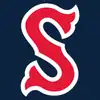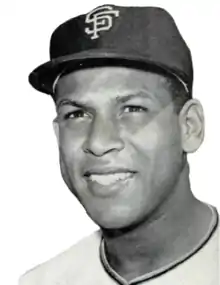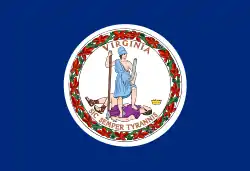Salem Red Sox
The Salem Red Sox are a Minor League Baseball affiliate of the Boston Red Sox of Major League Baseball (MLB), based in Salem, an independent city adjacent to Roanoke, Virginia. The team is a member of South Atlantic League, which competes at the Class A level. Home games are played at Haley Toyota Field at Salem Memorial Ballpark, a 6,300 seat facility opened in 1995.
| Salem Red Sox Founded in 1955 Salem, Virginia | |||||
| |||||
| Minor league affiliations | |||||
|---|---|---|---|---|---|
| Class | Class A | ||||
| Previous classes | Class D (1955–1967) Class A-Advanced (1968–2020) | ||||
| League | South Atlantic League | ||||
| Division | Northern | ||||
Previous leagues | Appalachian League (1955, 1957–1967) Carolina League (1968–2020) | ||||
| Major league affiliations | |||||
| Team | Boston Red Sox (2009–present) | ||||
| Previous teams |
| ||||
| Minor league titles | |||||
| League titles (7) |
| ||||
| Division titles (10) |
| ||||
| Team data | |||||
| Name | Salem Red Sox (2009–present) | ||||
Previous names |
| ||||
| Mascot | Muggsy (1997–present) Misty (2004–present) Big Mo (2005–2008) The Baseball Nut (1995–1996) Long Ball Silver (1987–1994) | ||||
| Ballpark | Haley Toyota Field at Salem Memorial Ballpark (1995–present) | ||||
Previous parks | Kiwanis Field (1955–1994) | ||||
Owner(s)/ Operator(s) | Fenway Sports Group | ||||
| General Manager | Allen Lawrence | ||||
| Manager | Corey Wimberly | ||||
From 1968 through 2020, the team competed at the Class A-Advanced level in the Carolina League. The team, known from 1995 through 2008 as the Salem Avalanche, was previously affiliated with the Houston Astros (2003–2008) and Colorado Rockies (1995–2002). Prior to 1995, the franchise played under several different names and affiliations.
History
The franchise was owned from 1986 until 2006 by Kelvin Bowles, a local resident and major league baseball scout. Bowles (who, coincidentally, scouted for the Boston Red Sox from 2002–05) bought the team when it was in danger of moving from Salem. In 2006, the team was sold to a pair of businessmen from Atlanta who also owned the Fort Wayne Wizards. In December 2007, this group sold the team to Fenway Sports Group, a subsidiary of the Boston Red Sox ownership group, preparing the team for an affiliation change after its Player Development Contract with the Houston Astros ended in 2008. As such, the Salem Red Sox are owned by the same parent company that manages Liverpool F.C. and the Boston Red Sox.
In 2006, Salem Memorial Ballpark hosted the All Star Game between the Carolina League and California League.
Prior to the 2021 season, Salem moved from being the Red Sox' Class A-Advanced affiliate to being their Class A affiliate; in a corresponding move, the Greenville Drive moved from Class A to Class A-Advanced.[1]
Location and rivalry games
While the team is located in a relatively small city (population circa 25,000) when compared to other teams of its classification, the Red Sox are strongly identified with the Roanoke Valley as a whole, drawing fans from neighboring cities and counties within the roughly 300,000-person metropolitan area. The connection with neighboring Roanoke was emphasized during the 2017 Carolina League All-Star Classic, hosted by Salem, that was represented by a logo featuring the iconic Mill Mountain Star. Salem is also located in the Blue Ridge Mountains, which are featured prominently on the team's logo and are clearly visible over Haley Toyota Field's outfield walls. This mountain view includes the aforementioned star, visible on clear nights over the left field wall.
Haley Toyota Field at Salem Memorial Ballpark is located roughly 2 miles (3.2 km) from downtown Salem and is part of the James E. Taliaferro Sports and Entertainment Complex, which also includes the Salem Civic Center and Salem Football Stadium (location of the annual Stagg Bowl). The Red Sox share their stadium with the NCAA Division III Roanoke Maroons and have previously hosted the "Hokie-Smokey Classic" baseball series between the Tennessee Volunteers and the nearby Virginia Tech Hokies.
Given the teams' close proximity, their long-time histories in the league, and both competing in the Carolina League's North Division, Salem's chief rival is the Lynchburg Hillcats. The regular matchups of these teams, known as the "460 Series", named for U.S. Route 460 which connects the cities, has occasionally feature day/night doubleheaders during which two games will be split between the two cities over the course of the same day.
Championships and playoff appearances
Since switching the team's affiliation to Boston, the Red Sox have experienced a fair amount of success, winning one league championship (2013), two division championships, and making three playoff appearances. Overall, minor league teams in the Roanoke Valley have claimed 7 Appalachian and Carolina League Crowns 10 divisional championships, and 13 playoff appearances. These league and divisional titles are commemorated on the press box and sky boxes overlooking the Haley Toyota Field Grandstand.
Notable former players
See:
- List of Salem Red Sox players
- List of Salem Avalanche players
- List of Salem Buccaneers players
- List of Salem Redbirds players
- List of Salem Pirates players
- List of Salem Rebels players
At least one inductee to the National Baseball Hall of Fame has played for Salem; Orlando Cepeda, who played for the team when they were the Rebels in 1955.[2]
Club records
- Batting: .370 – Oswaldo Olivares, 1977
- Hits: 208 – Oswaldo Olivares, 1977
- Doubles: 43 – Garrett Atkins, 2001
- Triples: 17 – David Arrington, 1968
- Home Runs: 34 – Gerald Davis, 1981
- Total Bases: 280 – Oswaldo Olivares, 1977
- Runs Batted In: 103 – Gerald Davis, 1981
- Stolen Bases: 84 – Miguel Diloné, 1975
- Wins: 16 – Jim Minshall 1972
- Losses: 15 – Frank Brosious, 1983; James McKee, 1970
- Strikeouts: 186 – Ed Whitson, 1976; Doug Bair, 1972
- Walks: 127 – Benjamin Willbank, 1978
- Innings Pitched: 203 – Ed Whitson, 1976
- Earned Run Average: 2.11 – Josh Kalinowski, 1999
- Saves: 27 – Travis Thompson, 1999
Home attendance: 1968–present
- 1968 – 64,532
- 1969 – 63,248
- 1970 – 50,076
- 1971 – 37,872
- 1972 – 43,910
- 1973 – 45,915
- 1974 – 41,379
- 1975 – 39,007
- 1976 – 30,387
- 1977 – 32,744
- 1978 – 51,096
- 1979 – 43,036
- 1980 – 102,456
- 1981 – 72,125
- 1982 – 47,202
- 1983 – 56,451
- 1984 – 61,623
- 1985 – 71,788
- 1986 – 87,047
- 1987 – 111,661
- 1988 – 119,966
- 1989 – 121,581
- 1990 – 126,121
- 1991 – 131,582
- 1992 – 134,598
- 1993 – 145,657
- 1994 – 153,575
- 1995 – 140,111
- 1996 – 173,703 (new stadium)
- 1997 – 188,023
- 1998 – 189,069
- 1999 – 206,012
- 2000 – 200,863
- 2001 – 203,375
- 2002 – 196,347
- 2003 – 175,155
- 2004 – 224,991
- 2005 – 255,225
- 2006 – 237,724 (5 games cancelled due to heavy rain)
- 2007 – 258,469 (5 games cancelled)
- 2008 – 235,823
- 2009 – 231,186 (4,968 was stadium capacity with 1,000 covered seats not available for use)
- 2010 - 211,527
- 2011 - 226,337
- 2012 - 178,730
- 2013 - 172,293
- 2014 - 220,782
- 2015 - 228,120
- 2016 - 200,478
Total attendance – 6,640,978
Playoffs
- 1968 season: Lost to Lynchburg 1-0 in quarterfinals.
- 1969 season: Defeated High Point-Thomasville 2-0 in quarterfinals; lost to Burlington 2-0 in semifinals.
- 1972 season: Defeated Burlington 2-1 to win championship.
- 1974 season: Won both halves, making a playoff unnecessary.
- 1987 season: Defeated Hagerstown 2-0 in semifinals; defeated Kinston in championship.
- 1988 season: Lost to Lynchburg 2-1 in semifinals.
- 2001 season: Defeated Kinston 2-1 in semifinals; defeated Wilmington 3-2 in championship.
- 2006 season: Lost to Kinston 2-0 in semifinals.
- 2007 season: Defeated Kinston 2-1 in semifinals; lost to Frederick 3-1 in championship.
- 2009 season: Defeated Winston-Salem 3-0 in semifinals; lost to Lynchburg 3-0 in championship.
- 2013 season: Defeated Myrtle Beach 2-0 in semifinals; defeated Potomac 3-0 in championship.
- 2014 season: Lost to Myrtle Beach 2-1 in semifinals.
- 2016 season: Lost to Myrtle Beach 2-1 in semifinals.
- 2019 season: Lost to Wilmington 3-2 in semifinals.
Media information
- Media Relations Manager: Ben Gellman
- Flagship radio station:
- Number of games broadcast: All
- Newspapers covering the Red Sox:
- The Roanoke Times
- Salem Times-Register
- Official scorer: Billy Wells
- Public Address: Emile Brown
| Season(s) | Broadcaster |
|---|---|
| 1987 | Brian Barnhart |
| 1988–1990 | Dave Newman |
| 1990–1992 | Mike Minshall |
| 1993–1994 | Stu Paul |
| 1995 | Mark Neely |
| 1996–1997 | Mark Aucutt |
| 1998–1999 | Bob McElligott |
| 2000–2003 | Kevin Reiter |
| 2004 | Mick Gillispie |
| 2005–2006 | Adam Pohl |
| 2007–2008 | Jason Benetti |
| 2009–2014 | Evan Lepler |
| 2015–2016 | Kevin Burke |
| 2017–2019 | Ben Gellman |
| 2019–present | Melanie Newman |
Team mascots
Mugsy A St. Bernard mascot who made his rookie debut in professional baseball in 1997 with the Avalanche. According to the team's website, Mugsy descended from the passing Hale-Bopp comet that raced across the Roanoke Valley sky on April 4, 1997.
Misty Misty is a female saint bernard mascot who joined the team in 2005.
Lefty and Righty Coming to Salem all the way from Boston. Lefty and Righty are the new mascots. They're two red sox, both wearing Boston Red Sox hats, they also have an L on one's back and an R on the other.
Big Mo The Salem Avalanche's Kid's Club mascot, Big Mo is a giant abominable snowman.
The Baseball Nut The Avalanche's first mascot was this distinctive character, which resembled an almond. While the idea was original, the Baseball Nut proved to be unpopular. Lacking a cute or friendly appearance, the mascot intimidated children and was an object of derision by adult fans. Mugsy was developed as a replacement.
Roster
| Players | Coaches/Other | |||
|
Pitchers
|
Catchers
Infielders
Outfielders
|
Manager Coaches
| ||
References
- Collins, Matt (December 9, 2020). "Red Sox to reportedly keep all four full-season affiliates, leaving Lowell without affilation". overthemonster.com. Retrieved December 11, 2020.
- "Orlando Cepeda Minor & Mexican Leagues Statistics & History". Baseball-Reference.com. Retrieved September 4, 2019.



